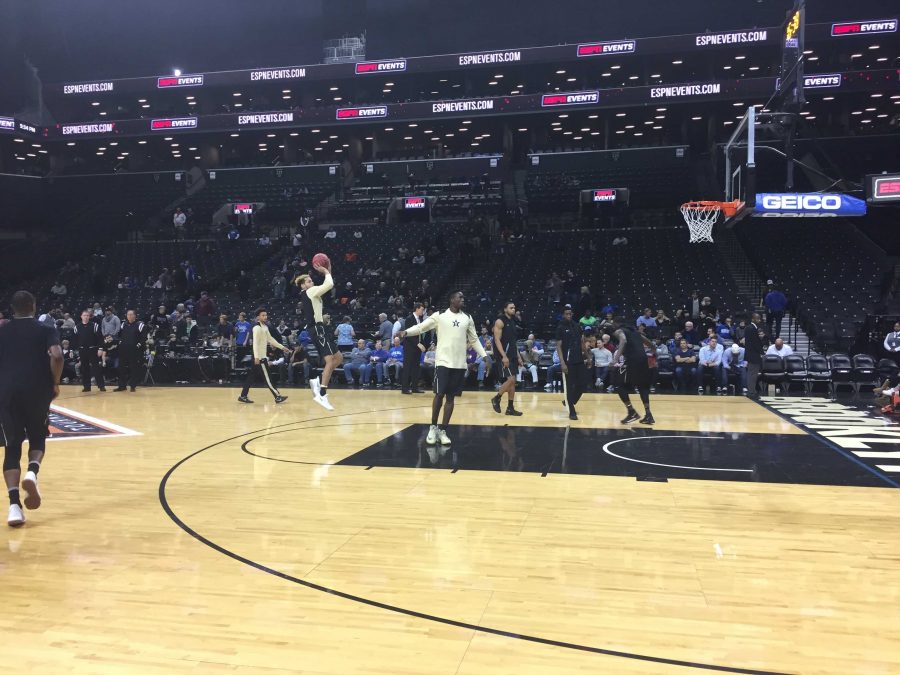If the NIT Tip-off tournament was a barometer for Vanderbilt’s season, the Commodores still have a long way to go.
After a 68-42 drubbing at the hands of Virginia, Vanderbilt came out looking for redemption in the consolation game against Seton Hall. Instead, a poor second-half performance saw the Commodores drop their third game in a row, 72-59 at the hands of the Pirates.
Here are three thoughts from Friday night’s contest.
New look starting lineup struggled
After a notably slow start against Virginia on Thursday night, Bryce Drew decided to tinker with the starting lineup. He sat all three of his seniors, as well as freshman point guard Saban Lee. Drew went with Larry Austin Jr., Maxwell Evans, Joe Toye, Clevon Brown, and Ejike Obinna. Perhaps Drew wanted to just switch things up and see what would happen, or perhaps he saw Seton Hall’s elite size in the front court and recognized that his usual three-guard approach would create mismatches on defenses. According to Drew, it wasn’t to send a message, and he wasn’t sticking anyone in the doghouse.
Regardless, the lineup fell flat. The five started both the first and second halves, and played just two minutes in each before being replaced. In those four minutes however, they were outscored 9-2, digging a hole for the now second team in both instances.
The rationale behind this move was legitimate. The regular starting lineup could not have played worse against Virginia, so anything seemed like an improvement. However, Drew sent out a lineup that provides little offense to solve the problem of little offense. Against the aforementioned Pirates’ frontcourt, Drew failed to place any shooters in the starting lineup, forcing the Commodores to try to score inside, where they met a similar fate to the one they faced against Virginia the night before. Straying from a three-guard starting lineup was a strategic move, but removing the three best scoring options in doing so seemed antithetical to Drew’s message of starting strong.
Dying by the three
For the entirety of last season, and heading into this one, Vanderbilt basketball has lived by the three ball.
Unfortunately, when you live by the three, you die by the three, and Vanderbilt died by the three in Brooklyn. After shooting just 22% from beyond the arc against Virginia, the team followed it up with another lackluster shooting night, shooting 26% from three. It’s easy to see why Vanderbilt led No. 10 USC for so long. They shot 48% from three, but when the shots aren’t falling, the offense sputters, and everything snowballs. The Commodores shot 0-12 on triples in the second half against Seton Hall, and it allowed the Pirates to run away with the ballgame.
Most of all, however, if you’re living and dying by the three, your survival skills are tested when forced to score without the three ball. On Friday night, Vanderbilt could not survive. Without a consistent three point shot to rely on, Vanderbilt tried to create the bulk of its offense at the rim, and looked awkward doing it. The Commodores committed 16 turnovers, many of which came on offensive fouls when recklessly attacking the paint.
Blocks at the rim led to runouts by the Pirates that Vanderbilt struggled to defend. At one point in this game, Vanderbilt went 12 and a half minutes without a single field goal, more than a quarter of the entire ballgame, spanning both halves. Seton Hall went on a 19-0 run during this span. Bryce Drew said after the game that the team has a small margin of error, and he was right, but the confirmation from Drew that the team needs to hit three point shots at a high clip to win games is a bit unnerving.
Getting big
Seton Hall is led by its star center, Angel Delgado. Delgado led the nation last year in both rebounding and offensive rebounding, and alongside forwards Ismael Sonogo and Desi Rodriguez, the Pirates pose a tough matchup on the boards on any given night. This figured to rear its head most against Vanderbilt, a small lineup with immensely inexperienced bigs. The Commodores clearly came to play in the paint, though, actually winning the rebounding battle against the bigger Pirates, 39-33.
Usually the team that wins the rebounding battle wins the game, especially when Vanderbilt missed so many shots on the offensive end, but Obinna did an excellent job keeping Delgado at bay. The 17-year-old freshman from Nigeria was tested in both games against more experienced, but held his own despite the scoreboard.
Even more impressive was the performance put forth by Jeff Roberson against Seton Hall. Roberson is an undersized power forward, but he notched 13 rebounds and was the main reason why Vanderbilt stayed in this game for as long as they did. Drew commended Roberson’s heart and effort on display every time he takes the floor, but in a game where the Commodores were overmatched, that heart and effort shined even more.



